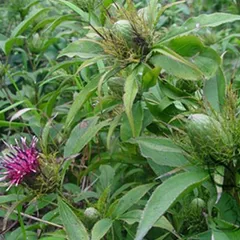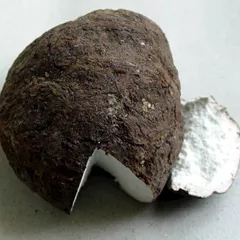Spleen or Kidney Yang Deficiency
The information provided here is not a replacement for a doctor. You shouldn't use it for the purpose of self-diagnosing or self-medicating but rather so you can have a more informed discussion with a professional TCM practitioner.
At a glance
Preliminary reading: What is a pattern?
Diagnosis
Common symptoms: Edema Coughing Vomiting Dizziness Loose stools and five other symptoms
Pulse type(s): Deep (Chen), Fine (Xi)
Tongue color: Pale
Tongue shape: Swollen, Tooth-marked
Treatment
Common formulas: Zhen Wu Tang
Pathology
Spleen or Kidney Yang Deficiency is a pattern of disharmony in Chinese Medicine.
Chinese Medicine views the human body as a complex system that tends toward harmony. A pattern of disharmony is a disorder that prevents that harmony from occurring.
Patterns give rise to symptoms that may at first glance seem unrelated from a Western standpoint but that actually make a lot of sense when one understands Chinese Medicine theory. For instance here Spleen or Kidney Yang Deficiency gives rise to such diverse symptoms as abdominal pain that worsens with cold, urinary difficulty, deep aching and heaviness in the extremities and dizziness (as well as thirteen others).
To diagnose a pattern, analyzing a patient's pulse as well as their tongue is common practice. In the case of Spleen or Kidney Yang Deficiency patients tend to exhibit deep (Chen) or fine (Xi) pulses as well as a pale tongue.
Patterns aren't exactly the Chinese Medicine equivalent to Western diseases, they're rather the underlying causes behind diseases or health conditions. Here Spleen or Kidney Yang Deficiency is thought to sometimes induce conditions such as intermenstrual bleeding, hypertension or pelvic inflammatory disease (as well as fifteen others).
Diagnosing Spleen or Kidney Yang Deficiency
Diagnosing a pattern in Chinese Medicine is no easy feat and should be left to professional practitioners. In particular one has to know how to differentiate between different types of pulses and tongue coatings, shapes and colors as well as learn to read from a long list of seemingly unrelated symptoms.
Pulse type(s): Deep (Chen) or fine (Xi)
Tongue color: Pale
Tongue shape: Swollen, Tooth-marked
Main symptoms: Edema Coughing Vomiting Tinnitus Dizziness Back pain Knee pain Tiredness Depression Loose stools Palpitations Feeling of cold Urinary difficulty Frequent urination Heavy sensation in the head Abdominal pain that worsens with cold Deep aching and heaviness in the extremities
Treating Spleen or Kidney Yang Deficiency
Herbal formulas used to treat Spleen or Kidney Yang Deficiency



The top herbs in Zhen Wu Tang are Prepared Aconite (Zhi Fu Zi), Atractylodes Rhizomes (Bai Zhu) and Poria-Cocos Mushrooms (Fu Ling)
Zhen Wu Tang
Source date: 220 AD
Number of ingredients: 5 herbs
Key actions: Warms and tonifies the Yang and Qi of the Spleen and Kidneys. Eliminates Dampness.
Formula summary
Zhen Wu Tang is a 5-ingredient Chinese Medicine formula. Invented in 220 AD, it belongs to the category of formulas that warm and transform water and Dampness.
Besides Spleen or Kidney Yang Deficiency, Zhen Wu Tang is also used to treat Spleen Yang Deficiency or Oedema.



The top herbs in Gu Ben Zhi Beng Tang are Milkvetch Roots (Huang Qi), Ginseng (Ren Shen) and Atractylodes Rhizomes (Bai Zhu)
Gu Ben Zhi Beng Tang
Formula summary
Gu Ben Zhi Beng Tang is a 6-ingredient Chinese Medicine formula. Invented in 1826 AD, it belongs to the category of formulas that tonify Qi and Blood.
Besides Spleen or Kidney Yang Deficiency, Gu Ben Zhi Beng Tang is also used to treat Qi Deficiency.
Related conditions
Please keep in mind that a Western Medicine condition can be caused by several Chinese Medicine patterns of disharmony and vice versa. As such a patient suffering from one of the conditions below will not necessarily be suffering from Spleen or Kidney Yang Deficiency, it is just one pattern that's commonly associated with the condition. Click on a condition to learn what other patterns it's associated with.
Intermenstrual bleeding Hypertension Pelvic inflammatory disease Trigeminal neuralgia Meniere's disease Congestive heart failure Rheumatoid arthritis Lumbar disc disease Sciatica Chronic glomerulonephritis Hyperaldosteronism Hypothyroidism Ascites from cirrhosis Orthostatic hypotension Basilar insufficiency Osteoarthritis Piriformis syndrome Postconcussion headache
Special highlight: the link between intermenstrual bleeding and Spleen or Kidney Yang Deficiency

Milkvetch Roots (Huang Qi) is the key herb for Gu Ben Zhi Beng Tang, a formula used for intermenstrual bleeding caused by Spleen or Kidney Yang Deficiency
Typical symptoms for intermenstrual bleeding caused by Spleen or Kidney Yang Deficiency: Tinnitus Dizziness Back pain Knee pain Tiredness Depression Loose stools Feeling of cold Frequent urination
Recommended herbal formula: Gu Ben Zhi Beng Tang
Mid-cycle bleeding under this pattern is characterized by red color menstruating Blood without clots. Normally there is no abdominal pain and the volume can be scanty or heavy.
The Kidneys store the Essence and the Spleen controls the Blood. When these two Organs' Yang is Deficient, no sufficient Qi, which is a Yang element, is created to hold Blood in its vessels. It also injures the Directing and Penetrating Vessels. Thus unwanted bleeding is the result.
Excessive physical activities, from...Read more about intermenstrual bleeding
